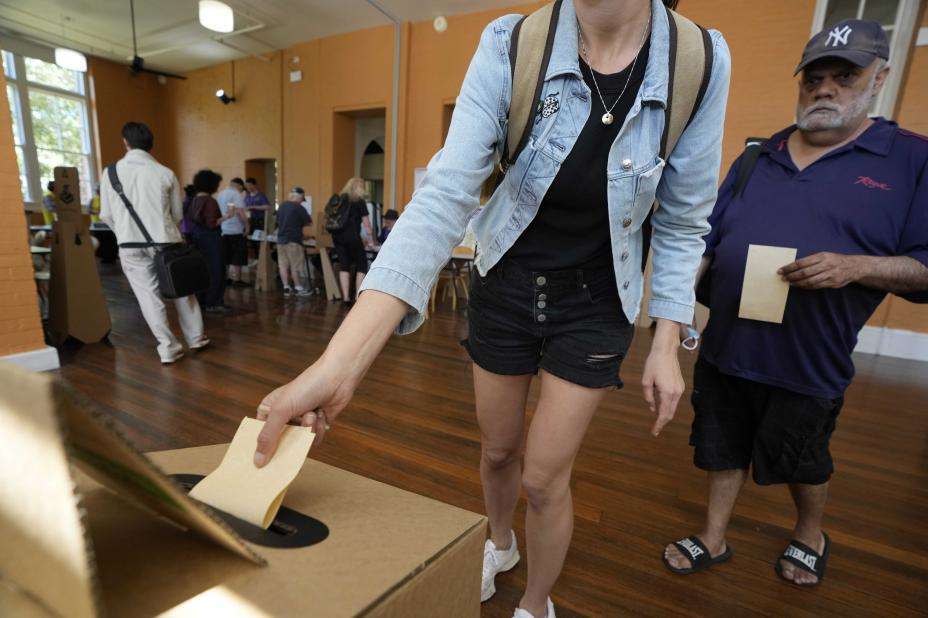Voters cast their ballots in a box in Redfern, Australia, on Saturday. The vote ended with a categorical no to the creation of an assembly for the country’s indigenous population. Photo: Rick Rycroft/AP/NTB
By NTB | 15.10.2023 18:02:23
Policy: The defeat in this weekend’s referendum is a blow to the indigenous population, and their leaders called for a week of silence and reflection on Sunday.
In the referendum, people were asked if they wanted to change the constitution to recognize Aboriginal and Torres Strait Islander people by creating a separate advisory body, the Voice to Parliament.
Such an arrangement would have strong similarities with the Norwegian Sami Parliament.
If the proposal had passed, it would have required a national majority as well as a majority in four states. However, all six Australian states rejected the proposal.
In Australia, all constitutional amendments must be subject to a referendum. The vote on an indigenous assembly was the first of its kind since 1999.
They further claim that Aboriginal and Torres Strait Islander flags will be flown at half-mast next week. They encourage other Australians to do the same.
The outcome is seen as a major setback for reconciliation efforts with indigenous people. Unlike other countries with a similar history, such as Canada and New Zealand, Australia has not formally recognized or entered into agreements with the country’s indigenous populations.
Ethnic groups make up 3.8 percent of Australia’s 26 million people. Many in this group are very disappointed.
– This shows that Australia is an intolerant society when it comes to racial issues. This must stop, Len Clarke, an Aboriginal leader from Victoria, told the ABC news channel, according to Ritzau.
To this day, many Indigenous people live in poor and isolated communities without adequate access to health services, education and work. Statistically speaking, Aboriginal people have a life expectancy eight years lower than that of the majority population.
Before the vote, UN special envoy for Indigenous rights Jose Francisco Cali Tzay said an Indigenous Assembly would help Australia meet its human rights obligations.
– Australia’s indigenous people have the right to participate in decisions that concern them, he declared, according to AFP.
– I had a duty, as a politician with a conscience, to present this to the Australian people, Albanese said on Saturday.
Strong cross-party support is seen as a necessity to push through constitutional changes in Australia. Only eight of the 45 amendment proposals presented in the country’s 122-year history have achieved a majority.
Tanya Hosch was one of the champions of the creation of the Assembly and spent a decade developing the model. She says she is devastated by the outcome.
– There will be a lot of pain and distress, and we need to take the time to help ourselves understand this message and what it means, she said.
Among other things, activists argued that the views of the indigenous population would be easier to hear, which could lead to better public services and better living conditions for this ethnic group.
However, opponents of the referendum in Australia have put forward several counter-arguments: granting special rights to one ethnic group would cause divisions for the nation, and this project is just empty words that will not lead to real improvements for indigenous peoples.
Most of the opposition came down on the no side, although some politicians from conservative parties supported similar proposals.
– It is bitterly ironic that people who have lived on this continent for 235 years refuse to recognize those who have called this continent home for over 60,000 years. This is not understandable, Australia’s indigenous leaders say in a statement.
Since the establishment of the first British colony in Australia in the late 18th century, indigenous rights and conditions have declined significantly. In the 20th century, between a tenth and a third of all indigenous children were taken from their families, according to the Store Norske Lexikon.
Prime Minister Anthony Albanese blames the defeat on opposition politicians who campaigned against her. Albanese promised to hold the referendum when he was elected last year and took responsibility for its implementation despite declining voter support.
Several activists cited the Norwegian Sami Parliament as an example of how such a body could work, and the SBS television network sent a team to Norway to interview Sami politicians and activists for a related report with the referendum.
(©NTB)

